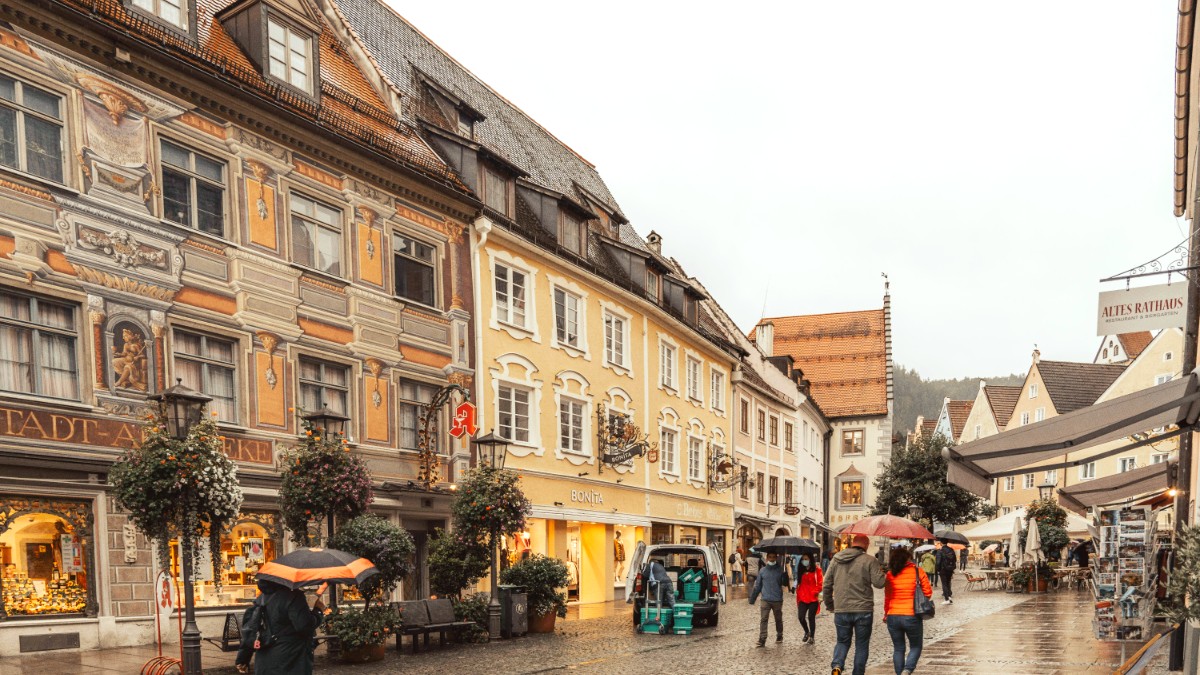
Bavaria, Germany
Discover a place where ancient roads once carried Roman legions and medieval trade routes flourished. Kings chose this region for their dream castles. Alpine freshness fills the air. The landscape holds wide views. Every corner of Füssen tells a story, a call to explore its unique character. Look forward to experiences joining cultural richness with outdoor adventure.
This guide presents detailed facts and practical advice. Use this information to tailor your trip.
Explore cobblestone streets. Look up at towering castles. Walk along calm lake shores. Füssen presents a blend of relaxation and activity. Its position at the foot of the mountains makes it a place for both quiet reflection and exhilarating pursuits.
Füssen sits in the southwestern corner of Bavaria, Germany. It belongs to the Ostallgäu district. This location places it directly at the foothills of the Alps, giving the town a mountain setting. The Lech River, flowing from Austria, carves its way through Füssen. It then widens into Lake Forggensee to the north. South of town, smaller, pristine lakes like Alpsee and Schwansee dot the landscape. These bodies of water reflect the surrounding mountains and castles.
The town’s elevation stands at approximately 800 meters (2,625 feet) above sea level. The surrounding region is known as the Allgäu. This area features rolling hills, lush meadows, and dense forests. High peaks rise to the south, marking the German-Austrian border. The Säuling Mountain and Tegelberg Mountain are prominent local landmarks. Tegelberg features a cable car ride presenting wide views of the entire region. From its summit, visitors gain a broad perspective of Füssen, the nearby castles, and the numerous lakes.
Turquoise water, narrow gorge, Lechfall. Hiking trail start.
Bavaria’s fifth-largest lake, reservoir. Summer boat tours and water sports.
Natural, clear, cold water. Quiet walking paths.
Rolling hills, lush meadows, dense forests. Diverse range of natural activities.
Glacial formations, valleys, hills, deep lakes. Dramatic visual contrast.
Füssen’s geography displays a diverse range of natural activities. The Lech River, famous for its turquoise water, flows through a narrow gorge just south of the town center. Here, the Lechfall, a natural waterfall, presents a scenic stop. This area also serves as a starting point for hiking trails. The proximity to the Alps means trails vary in difficulty. Some paths wind through gentle valleys, while others ascend steep mountain slopes.
Lake Forggensee, Bavaria’s fifth-largest lake, is actually a reservoir. It fills in spring with melted snow and serves as a popular spot for boat tours and water sports in summer.
Lake Alpsee, closer to the castles, is a natural lake known for its clear, cold water and quiet walking paths. The landscape around these lakes presents flat terrain, suitable for cycling and easy strolls.
This combination of mountains, rivers, and lakes shapes Füssen’s identity. It creates a setting for both relaxation and active exploration in all seasons. The region’s geological makeup, formed by glacial movements, results in its characteristic valleys, hills, and deep lakes. These features display a dramatic visual contrast. The rich soil sustains agriculture, with dairy farming a visible industry across the Allgäu. The crisp, clean air comes from the surrounding forests and mountain elevations. This environment upholds a range of flora and fauna, drawing nature lovers. Füssen’s position acts as a natural gateway to the wider Bavarian and Austrian Alps. This geographical placement attracts those seeking mountain adventures or serene lakeside moments.
Füssen is a long history, dating back to Roman times. The town sits along the ancient Via Claudia Augusta, a Roman road connecting Italy with Augusta Vindelicorum (modern-day Augsburg). This Roman connection gave Füssen its early standing as a trading post and military outpost. Archaeological discoveries in the area show a Roman presence from the 1st century AD.
This road brought goods, ideas, and people, laying the foundation for future development.
In the Middle Ages, Füssen grew around a Benedictine monastery, St. Mang Abbey, founded in the 8th century. The abbey became a center of religious and cultural life. Its impressive Baroque church, the Basilica of St. Mang, still dominates the town’s skyline. The town itself gained municipal rights in the early 14th century.
The High Castle (Hohes Schloss Füssen) sits above the Old Town. It served as the summer residence for the Prince-Bishops of Augsburg. This late-Gothic castle features unique trompe l'oeil paintings on its exterior walls, creating an illusion of architectural depth. Its construction spans several centuries, reflecting changing architectural styles. The castle houses the Municipal Museum today, preserving artifacts from the town’s past and showing its artistic heritage.
Füssen also has an unique history as an European center for lute and violin making. From the 16th century, master luthiers from Füssen established workshops across Europe. They created instruments renowned for their craftsmanship. This tradition thrived for centuries, shaping the town’s economy and reputation. The Museum of Füssen dedicates a section to this history, displaying examples of these fine instruments. This craft heritage broadens Füssen’s cultural identity.
The town’s history intertwines with the Wittelsbach dynasty, notably King Ludwig II of Bavaria. Ludwig II spent his childhood summers at Hohenschwangau Castle, a short distance from Füssen.
Füssen serves as a gateway to the famous castles of Neuschwanstein and Hohenschwangau. These royal residences draw millions of visitors each year.
Füssen’s Old Town invites exploration. Cobblestone streets wind past historic houses with painted facades. Shops, cafes, and traditional Bavarian restaurants line these pathways.
The natural surroundings of Füssen supply many outdoor activity chances. The town sits among mountains and clear lakes like Alpsee and Forggensee.
The town maintains a welcoming atmosphere. Its compact size offers simple navigation on foot.
Public transportation connects the town center to the castles and other nearby attractions.
The "Füssen Card," often from local accommodations, gives free bus travel and discounts, creating convenience and saving money.